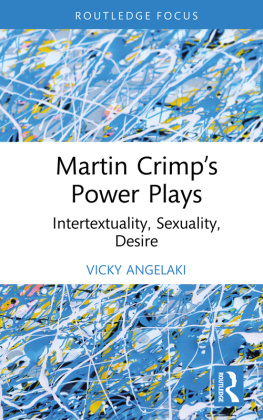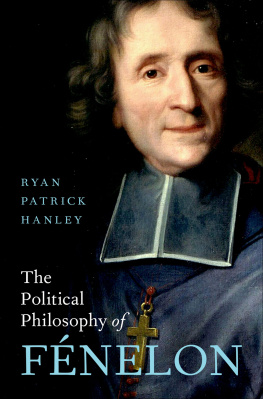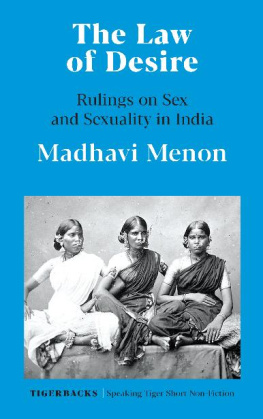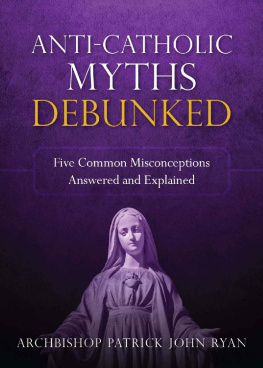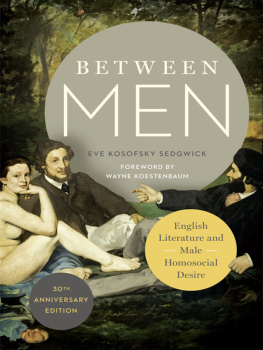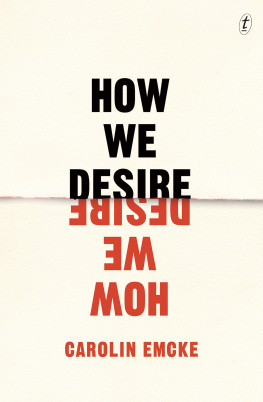Ryan Patrick Murphy - Deregulating Desire (Sexuality Studies)
Here you can read online Ryan Patrick Murphy - Deregulating Desire (Sexuality Studies) full text of the book (entire story) in english for free. Download pdf and epub, get meaning, cover and reviews about this ebook. year: 2016, publisher: Temple University Press, genre: Politics. Description of the work, (preface) as well as reviews are available. Best literature library LitArk.com created for fans of good reading and offers a wide selection of genres:
Romance novel
Science fiction
Adventure
Detective
Science
History
Home and family
Prose
Art
Politics
Computer
Non-fiction
Religion
Business
Children
Humor
Choose a favorite category and find really read worthwhile books. Enjoy immersion in the world of imagination, feel the emotions of the characters or learn something new for yourself, make an fascinating discovery.

- Book:Deregulating Desire (Sexuality Studies)
- Author:
- Publisher:Temple University Press
- Genre:
- Year:2016
- Rating:5 / 5
- Favourites:Add to favourites
- Your mark:
- 100
- 1
- 2
- 3
- 4
- 5
Deregulating Desire (Sexuality Studies): summary, description and annotation
We offer to read an annotation, description, summary or preface (depends on what the author of the book "Deregulating Desire (Sexuality Studies)" wrote himself). If you haven't found the necessary information about the book — write in the comments, we will try to find it.
Deregulating Desire (Sexuality Studies) — read online for free the complete book (whole text) full work
Below is the text of the book, divided by pages. System saving the place of the last page read, allows you to conveniently read the book "Deregulating Desire (Sexuality Studies)" online for free, without having to search again every time where you left off. Put a bookmark, and you can go to the page where you finished reading at any time.
Font size:
Interval:
Bookmark:
DEREGULATING
DESIRE
In the series Sexuality Studies,
edited by JANICE IRVINE and REGINA KUNZEL
ALSO IN THIS SERIES:
Heike Bauer, Sexology and Translation: Cultural and Scientific Encounters across the Modern World
Lynette Chua, Mobilizing Gay Singapore: Rights and Resistance in an Authoritarian State
Thomas A. Foster, Sex and the Founding Fathers: The American Quest for a Relatable Past
Colin R. Johnson, Just Queer Folks: Gender and Sexuality in Rural America
Lisa Sigel, Making Modern Love: Sexual Narratives and Identities in Interwar Britain
DEREGULATING
DESIRE
Flight Attendant Activism,
Family Politics, and Workplace Justice
Ryan Patrick Murphy

TEMPLE UNIVERSITY PRESS
Philadelphia, Pennsylvania 19122
www.temple.edu/tempress
Copyright 2016 by Temple UniversityOf The Commonwealth System of Higher Education All rights reserved
Published 2016
Library of Congress Cataloging-in-Publication Data Names: Murphy, Ryan Patrick, 1975 author.
Title: Deregulating desire : flight attendant activism, family politics, and workplace justice / Ryan Patrick Murphy.
Description: Philadelphia : Temple University Press, 2016. | Series: Sexuality studies | Includes bibliographical references.
Identifiers: LCCN 2016003227| ISBN 9781439909881
| ISBN 9781439909898 | ISBN 9781439909904 (e-book) Subjects: LCSH: Flight attendantsLabor unionsUnited States. | SexismUnited States. | FeminismUnited States. | Work and familyUnited States. | BISAC: SOCIAL SCIENCE / Sociology / Marriage & Family. | HISTORY / United States / 20th Century. | SOCIAL SCIENCE / Womens Studies.
Classification: LCC HD6515.A43 M86 2016 | DDC 331.88/113877420973dc23
LC record available at https://lccn.loc.gov/2016003227
CONTENTS
ACKNOWLEDGMENTS
A central argument of this book is that the pro-business and pro-family social movements of the post-1970 period have tried to make domesticity and hard work the central organizing principles of society. These activists have insisted that a renewed commitment to family and work should replace the other affinities that have connected people across space and time. The following pages take the opposite position, however, as a testament to the importance of a multiplicity of friendly, intimate, intellectual, professional, and political relationships. In contrast to demonstrating the value of the atomized individual intellectual, Deregulating Desire acts as an archive of dialogue with friends in bars at all hours of the day and night; with my mentors at the Association of Flight AttendantsCWA; with displaced flight attendants in San Francisco, Dallas, Kansas City, and a host of other places; and with my students and colleagues in classrooms at the University of Minnesota, at Earlham College, and in other venues where I have studied and worked. Here I name a few people and programs whose support has been particularly influential to the story I have chosen to tell.
First and foremost, I am humbled by the generosity of dozens of front-line flight attendants who contributed the firsthand evidence and arguments that made this book possible. Although many flight attendants who agreed to be interviewed had lost their jobs, and all struggled to adjust to lower wages, more costly health insurance, and reduced retirement benefits, they took time off work and drove long distances to meet with me, or they cooked me dinner while I rummaged through the archives in their basements. I am particularly thankful to the many former TWA flight attendants who participated in this project, because their journey through the past two decades has been unusually difficult. Paula Mariedaughter and Mary Ellen Miller were immensely generous with their time and with the ideas they shared about the past. Dixie Daniels and Victoria Gray engaged in regular e-mail exchanges to verify the details about collective bargaining, representation elections, and seniority integration. Richard Wagner, Diane Watson, and attorney Bill Jolley also took significant amounts of time from their schedules to contribute to the project. A number of flight attendants, especially Kaye Chandler, Janet Lhuillier, and Ed Sanford, graciously granted me access to their own collections of documents. I am grateful for the support and mentorship I received from my fellow flight attendant activists in AFA-CWA Council 11 in San Francisco, especially Dawn Marie Bader, Christine Black, Dante Harris, Jeanne Heier-Donellan, Stan Kiino, Roxanne Ng, Beth Skrondal, and Terry Sousoures. I also thank everyone who answered phones, sent out e-mail blasts, made picket signs, and handed out leaflets to passengers and coworkers during the ongoing crises of 9/11, the United bankruptcy, and the pension termination, as even the smallest contributions to the movement provided me with the inspiration to tell this story.
My intellectual mentors gave me new tools and ideas that helped enrich my conversations with flight attendants. My undergraduate adviser and friend Peter Rachleff contributed greatly to this book. His lifelong commitment to trade union activism, his immense effectiveness in the classroom, and his ongoing willingness to reinvent both himself and the field of labor history are great inspirations in my own life and career. I thank my graduate adviser, Jennifer Pierce, for her unflagging support for my work. Jennifers deep knowledge of the intellectual and professional terrain of the social sciences and humanities has been a tremendous material resource for this project, and her encouragement during the 20082009 economic crisis is perhaps the most important reason that I have been able to continue working full time as an academic. Thanks go to Kevin Murphy, whose broad, interdisciplinary knowledge has provided a wellspring of ideas for this book. Kevin is both a supportive mentor and one who asks the toughest question on the test. That rigor has added both depth and clarity to the arguments I make herein. I am grateful to all of my teachers who provided generous comments on the many drafts of the manuscript, especially Tracey Deutsch, Lisa Disch, Kale Fajardo, Roderick Ferguson, Karen Ho, Regina Kunzel, Helga Leitner, and Eric Sheppard, whose input has been particularly influential to my work as it has evolved.
I thank those whose generous financial support helped make this book possible. The Graduate School Fellowship and Doctoral Dissertation Fellowship at the University of Minnesota provided the time I needed to research and write. A travel grant from the Tamiment Library at New York University allowed me to conduct in-depth archival research. I am grateful to Macalester College for the research and travel funds it offers visiting assistant professors, which allowed me to take a month-long writing trip that sped my revisions along. Most importantly, I thank Greg Mahler and other leaders at Earlham College who have advocated for material support for research and for the pre-tenure sabbatical program that made the final publication of this book possible.
I am grateful to Janice Irvine, Regina Kunzel, and everyone who has worked on the Sexuality Studies series at Temple University Press. Multiple rounds of generous, incisive comments from Janice Irvine and Nan Enstad helped make this a more focused, original book. My editors at Temple offered continuous technical and intellectual support during the publication process. Janet Francendese taught me much about academic publishing and greatly influenced the original structure of the project as I transformed it from a dissertation into a book. Sara Cohens finesse at providing both support and critique energized my writing in the final phases of the project. I especially thank Michael Needham, whose developmental editingespecially his smart ideas about audience and argumentprovided the clarity I needed to finish this book while teaching full time in a liberal arts environment.
Next pageFont size:
Interval:
Bookmark:
Similar books «Deregulating Desire (Sexuality Studies)»
Look at similar books to Deregulating Desire (Sexuality Studies). We have selected literature similar in name and meaning in the hope of providing readers with more options to find new, interesting, not yet read works.
Discussion, reviews of the book Deregulating Desire (Sexuality Studies) and just readers' own opinions. Leave your comments, write what you think about the work, its meaning or the main characters. Specify what exactly you liked and what you didn't like, and why you think so.



